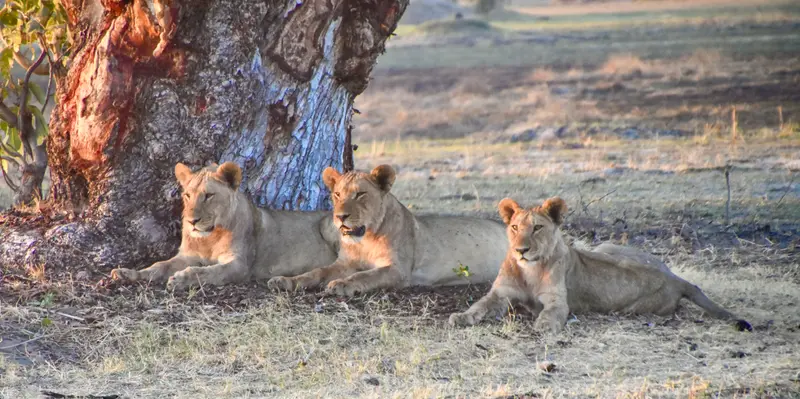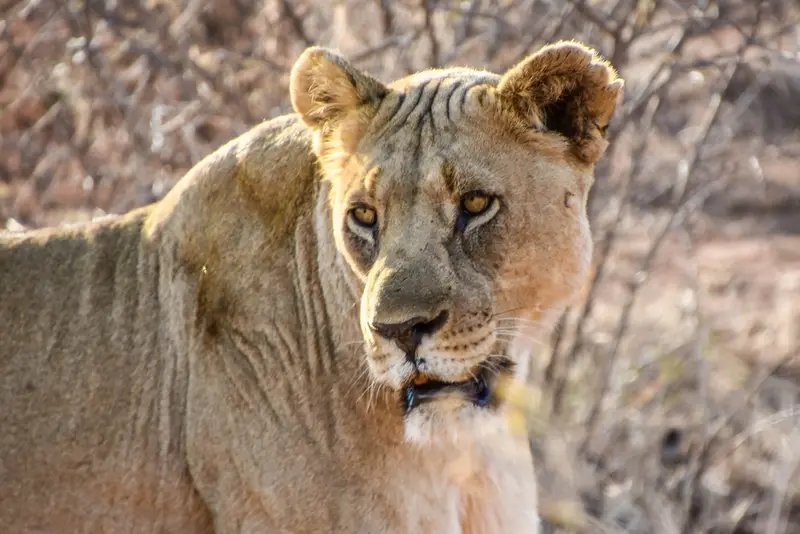The Perfect Shot
Madikwe, South Africa
I’ve only ever fired a gun once, and it was into a bale of hay at my UNCLE'S FARM. I’ve never felt the need to do it again, and I’ve certainly never been hunting. Holding that gun, I was incredibly nervous, shaking a bit, and my eyes were closed, but I managed not to hurt myself or anyone else, and so I consider the whole ordeal a success.
Since the desired outcome of each action—pointing a gun at something or someone and pointing a camera— are so intrinsically different behaviors on so many different levels, I am always a bit amused when I begin contemplating all the similarities that exist. Going hunting and going out to shoot photography, it’s no wonder we share so much of the same parlance.

First off, both involve a bewildering amount of gear and expensive equipment. Both involve extensive training about how to properly use that equipment, and a lot of preparation beforehand. The night prior to a shoot, they are cleaning their guns, I’m cleaning my lenses. They have ammunition, I have camera batteries and SD cards. We both often wake up in the middle of the night, in order to arrive on location before sunrise. Both activities involve copious amounts of deception and subterfuge, and we each have our little tricks that we use to discourage our subjects from behaving in unnatural or unpredictable ways. We are both constantly obsessed with what the sun and wind and weather are doing and we have ways to compensate on days when conditions are not in our favor. Sometimes simply returning on a different day is not an option.
When it comes time to actually pull the trigger, all shots are definitely not created equal. You can shoot something and still not really “get it.”
I’d say a hunter mortally wounding something (but not instantly killing it), and then having to chase it around the forest while it slowly dies is the equivalent of me getting a less than desirable shot that I know is going to cost me a lot of time trying to edit and manipulate in post. It’s not dead yet, but it will be eventually… Neither scenario is ideal, and creates quite a hassle, a lot more time and a lot more work. Best to get the shot right to begin with.
But sometimes the situation or the subject is just too tricky, and so you take the shot that you can get.
A digression, there are many different occasions as a photographer when it will be utterly impossible for you to see the location where you will be shooting prior to the day of the shoot. If it’s an exotic locale like the SAHARA or high altitude like the HIMALAYAS, where just getting there is a triumph in and of itself, then you come prepared for every possible eventuality, and just hope for the best. If it’s a residential landscape shoot, you can try talking to the homeowner about what the light conditions are like at their house, at different times of the day, but a novice error I used to make early in my career is asking a person when the light in their yard is “the best.” Big mistake. Invariably that person will confuse “best” with “most,” and have you arriving at their house at high noon when the shadows couldn’t possibly be worse. Unless of course that person is also a photographer… or a hunter.
There was a man I spoke with on the phone that had such a thick Texas accent, I had ignorantly written him off as a total red-neck (despite the fact that he had apparently done quite well for himself, otherwise I wouldn’t be photographing his house…). He lived quite far away in the country, so I would be showing up to his house on the day of the shoot sight-unseen, and thusly I had no choice but to have the dreaded and often punishing conversation with him over the phone about what the light is like at his house at different times of the day.
To my surprise, the account he gave me of the light and shadow at his house— along with even a forewarning about the likelihood of forceful winds coming in off the plains that could disturb the integrity of my shots— was so thorough, I knew immediately that he was a fellow photographer. He laughed and said, “No, I’m a hunter, but we have the same enemies— weather, sun, and wind!”
Both types of us shooters, we are also no stranger to waiting. Waiting for the light to change, the fog to clear, or a storm to pass—or sometimes more fundamentally— on the subject matter we want to shoot to simply SHOW UP. Sometimes they never do. Then, we both learn to pre-anticipate what direction the subject is likely to move, and when. I’ll tell you from experience, worse by far than shooting wild animals, is the losing battle of trying to photograph children. Especially in groups. They are notoriously fickle and rarely do what it looked like they were about to; their focus and direction can change on a dime! I’ll find myself doing the same thing with children that I do with wild animals: mentally repeating something so forcefully that it’s like I’m convinced I’m telepathic. “Please, just look up and left. Up and left. You can do it, just look up and left!” or “Move out of that shadow. Out. Move out! Move out. Ugh, now it’s splitting your face— move out just a few more inches….! Gotcha!”
Unlike hunting though, we can shoot something with our camera bullet, and “hit it (meaning yes, it was technically in our frame when we shuttered the photo), but still not really “get it.” The light was off, the expression wrong, a thousand things.
That’s why I sorta like the word capture, especially in the field. I might not know till later whether or not I “got” what I was aiming for artistically, whether or not I “killed it,” for now all I know is just that’s it’s been “captured.”
I might not have gotten anything worth keeping, it might very well turn out that what I got was shit, and needs to be released! Deleted forever, not to be shown to anyone, or ever looked at again.
More often than I care to admit, I will achieve something more akin to my earlier analogy— I will wound something just enough that with enough pursuit, I can eventually finish it off in post-production.

When so many factors fall into line perfectly— the weather, the light, the timing—and you end up getting the perfect shot, those are the days you truly live for. I often tell people that as a photographer, I live to capture the unexpected; and in that regard, every day, I am rarely disappointed.
And when we get that perfect shot, be it a photographer or a hunter, we both do the exact same thing with it: we reward that worthy shot by hanging it on a wall.